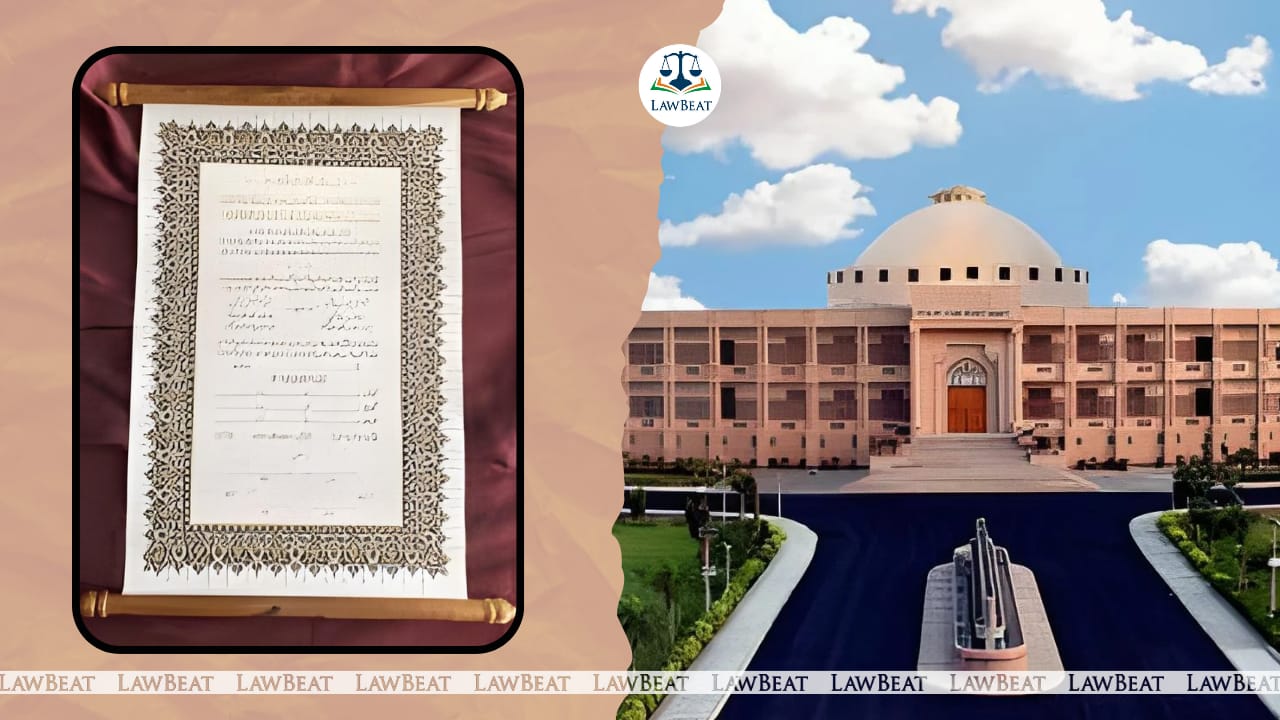Nikah-Namas Must Include Hindi or English, Not Only Urdu Which is Not Widely Known to Society : Rajasthan HC

The court emphasised that marriage documentation must be unambiguous, vividly clear, explicit, and transparent
Highlighting the need for marriage documentation to be comprehensible to the society, public servants, and officers of the court, the Rajasthan High Court, at Jodhpur, has directed the State to ensure that Nikah-Namas (Muslim marriage certificates) are issued in bilingual formats, incorporating Hindi or English alongside Urdu.
A Single judge bench of Justice Farjand Ali, issued the direction while hearing a case seeking to quash the First Information Report (FIR). The FIR was lodged by Ishrat Bano, the second respondent, who alleged irregularities in her marriage to Adnan Ali. The petitioners submitted a Nikah-Nama issued by a Qazi as evidence of the marriage. However, its exclusive use of Urdu became a point of contention, with the court highlighting the difficulties posed by the document's inaccessibility to non-Urdu-speaking officials. “It (Nikah-Nama) is not comprehensible as to what document wants to convey in view of having no knowledge of Urdu language,” the court remarked.
The court highlighted the significance of marriage documentation as a legal and societal instrument, stating that “Marriage, as we all know is an important sacrament and is considered as a sign of cohabitation between a male and a female which is acceptable in the civil society and is valid in the eyes of law. Nikah (marriage) is performed as per the rituals of the Muslim law in a community gathering by the person having knowledge of performing Nikah ceremony. This kind of sacred relationship should be recognized by a document which is unambiguous, vividly clear, explicit and transparent.”
The court addressed three critical issues, namely:
Clarity in Marriage Documentation: The court emphasised the role of clear and comprehensible marriage documentation, pointing out that the exclusive use of Urdu in Nikah-Namas creates considerable challenges, particularly for public servants, police officers, and court officials who may not be proficient in the language. “The Nikah- Nama (marriage certificate) can be taken as a piece of evidence in corroboration of oral plea of fact of marriage but when the content of certificate is not understandable to employees of Government institution, public institution, private institution and several other departments etc. then it creates problem and brings a perplexing situation and so also the same may increase complexities,” the court noted.
Standardization of Documentation: To address the issues of confusion and inefficiency, the court proposed that Nikah-Namas be issued in a bilingual format, including both Urdu and another widely understood language such as Hindi or English. The court underscored that a standardized, bilingual printed proforma would reduce the risk of administrative errors.
Regulation of Qazis: The court also raised concerns about the lack of oversight over individuals authorized to perform Nikah ceremonies. It recommended that the “District Magistrate/ District Collector of each city should keep a record of the persons who can perform Nikah-Nama and they should be enlisted in a separate file; only those people shall be eligible to perform the ceremony of Nikah; not every Tom, Dick & Harry.”
The court also directed the State to issue “guidelines/circular directing all Qazis, Maulanas, or other persons who can perform Nikah ceremony to the effect that the certificate of Nikah (Nikah-Nama) shall be issued in diglot, in which one of the language should be either English or Hindi.”
Additionally the court suggested that “a register can be maintained in the office of District Collector enlisting the names of Qazi etc. eligible to perform Nikah ritual.”
The State’s counsel assured the court that these recommendations would be considered for implementation. Meanwhile, the court granted interim relief, ensuring that the petitioners would not be arrested until further orders.
The court also directed the Secretary, Department of Minority Affairs to remain present on the next date of hearing on December 10, 2024.
Cause Title: Adnan Ali v State of Rajasthan [CRLMP-8295/2024]
